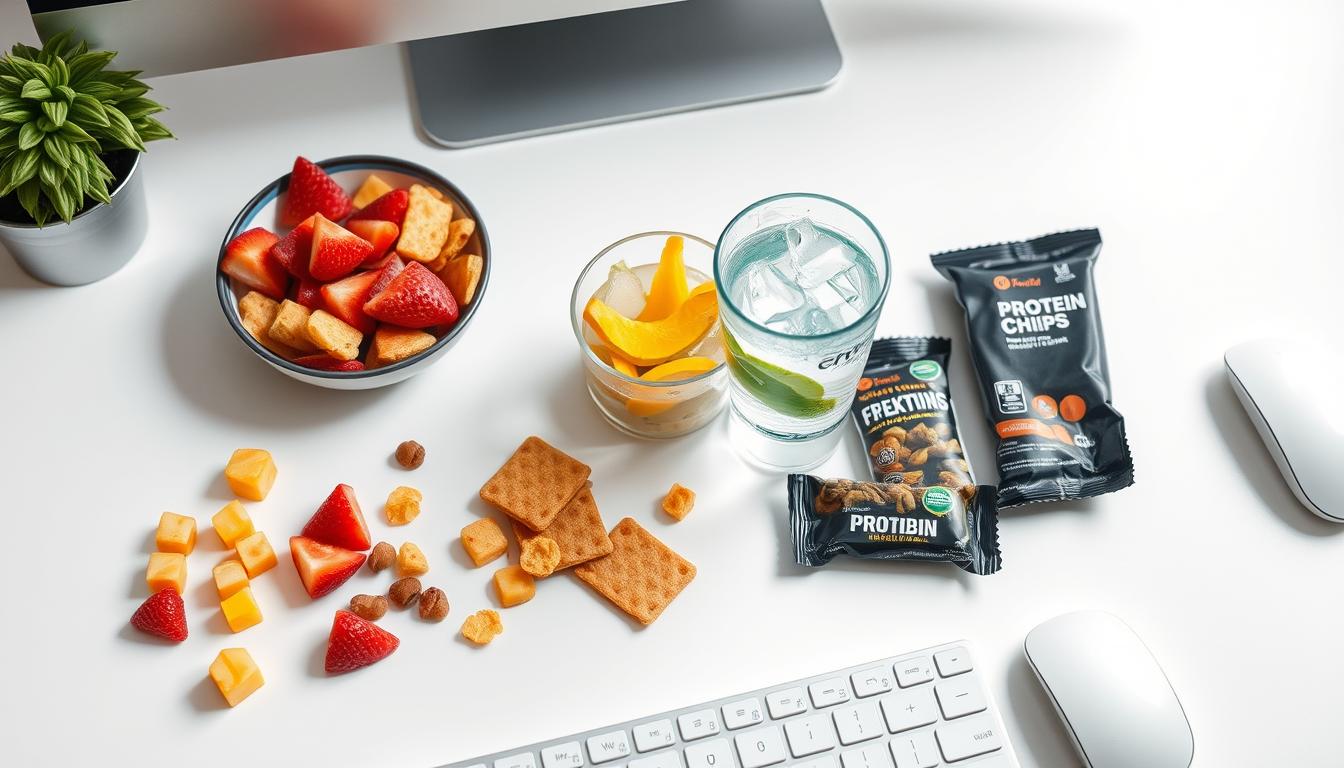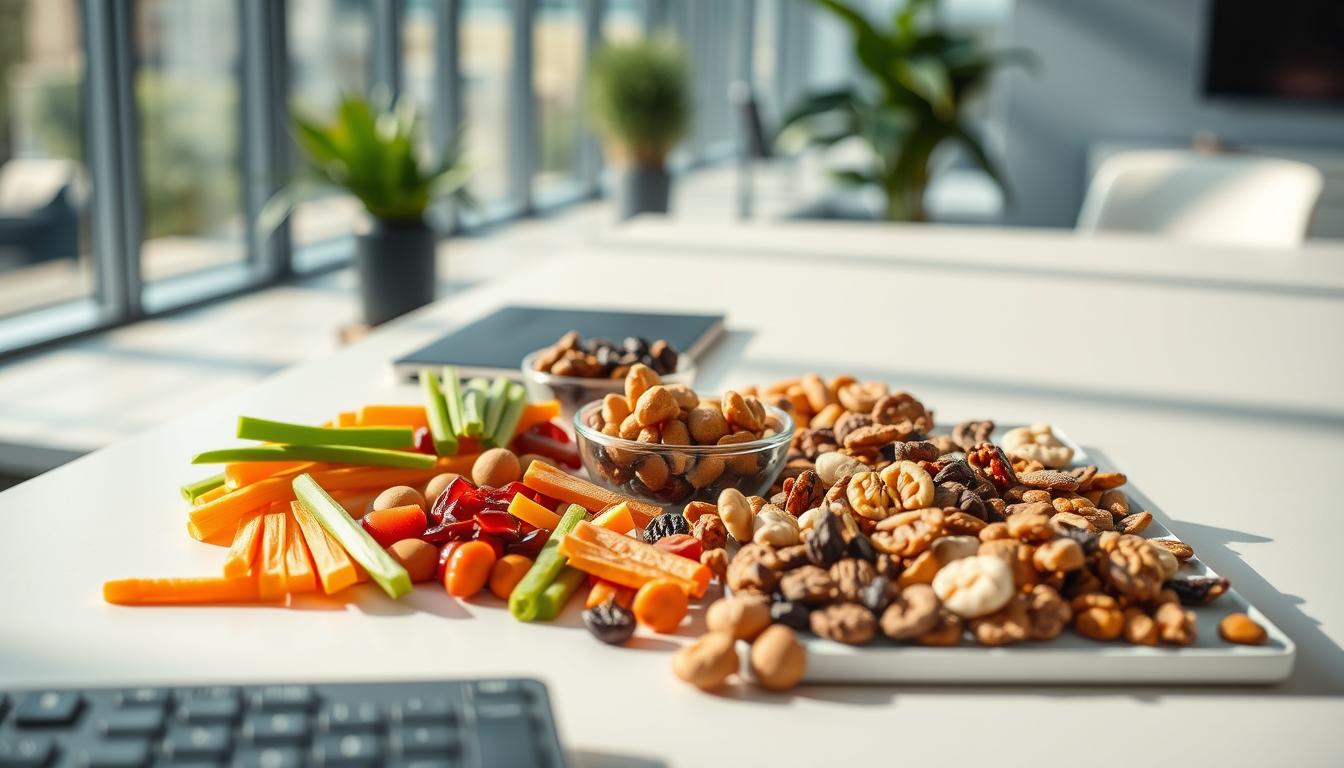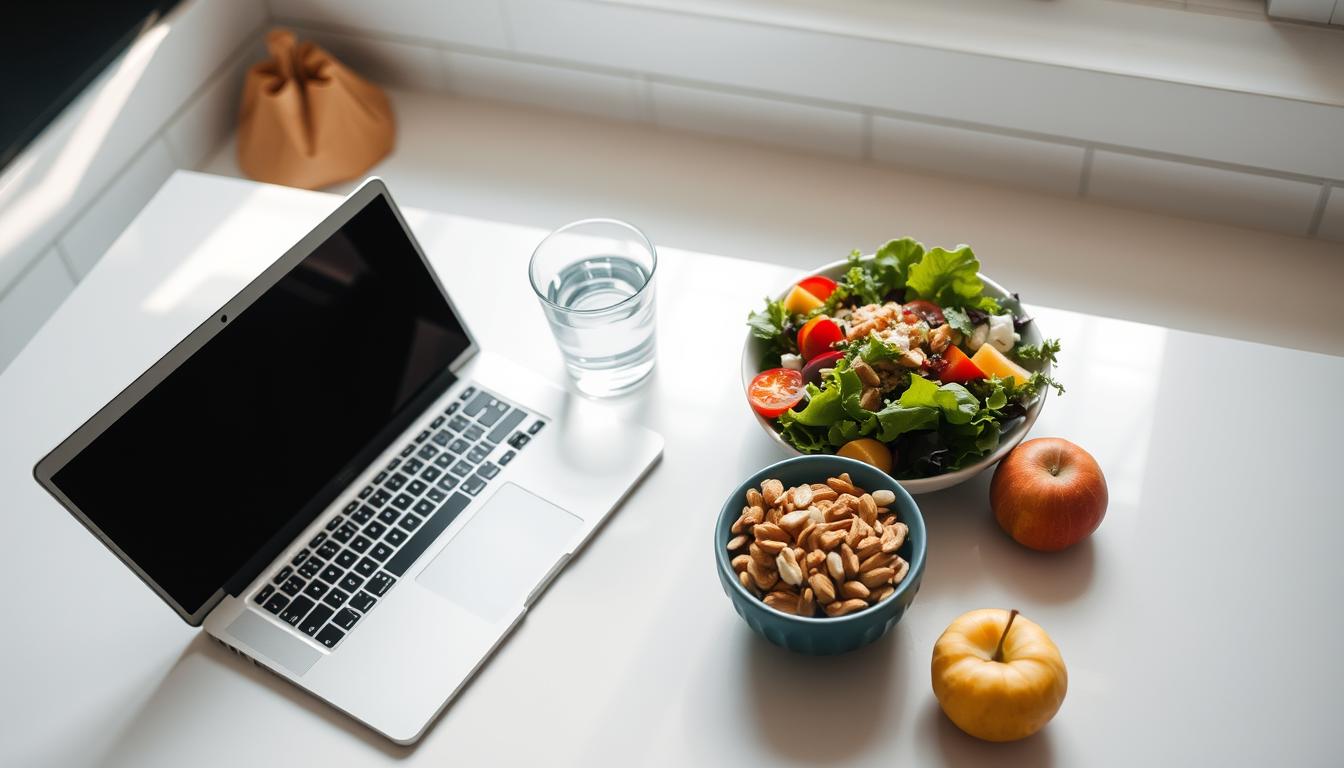Eating at your office desk should be clean to keep up productivity. Food crumbs and smells can mess up your workspace. To keep your work area neat, follow some easy clean eating tips.
Having a well-organized desk helps you focus and work better. It’s easier to stay on task without clutter around you.
Leftover food can bring bugs or mice, which nobody wants. Using a personal trash bin makes it easy to stay clean. Recycling helps too.
Try eating in break rooms instead of at your desk. This keeps the mess away from work areas. A clean workspace is good for everyone’s mood and work.
Understanding the Importance of Cleanliness in the Workplace
Keeping the workplace clean is key to healthy and productive employees. A tidy space cuts down virus spread and makes the place welcoming. Workers feel more driven and focused in an organized setting, boosting workplace health.
Clean and sorted areas help sharpen focus and raise work efficiency. Messy desks can distract and lower how well someone works. By having trash bins around, team members can easily keep their space neat and reduce mess.
It’s important to clean surfaces before and after eating to keep areas clean for everyone. Using microfiber cloths is great for cleaning screens and other surfaces safely. Making hand sanitizer available helps everyone keep their hands clean, especially before eating. Cleaning gadgets like phones and keyboards regularly stops dirt from collecting.
Cleanliness in the workplace is more than just looking nice. It makes cleaning easier, cuts down on dust, and boosts everyone’s health at work.
Declutter Your Office Desk Regularly
Keeping your desk tidy is key to being productive. Cleaning your desk often helps you work in a clear space. This makes it easier to concentrate on your work. Starting a routine for daily cleaning can make your workspace better. Just sorting papers daily and getting rid of stuff you don’t need can really help.
Daily Desk Cleaning Routines
It’s vital to clean your desk every day to keep it organized. Here are some helpful tips:
- Take everything off your desk to see what you really need.
- Either file or shred papers right after you’re done with them so they don’t pile up.
- Keep extra desk items out of sight in bins or drawers.
- Use jars or pen holders to keep your writing tools tidy.
- Try sorting things into piles as you work, so everything stays organized.
Benefits of a Clutter-Free Workspace
A tidy workspace can make you more productive. Research shows that a clean desk can:
- Lower stress and help you focus better, leading to more efficient work.
- Save up to 4.3 hours a week by not having to look for lost items.
- Make your office look nicer, which makes you enjoy working more.
- Help you stay organized by using labeled storage containers.
Checking your desk often can make it a better place to work in. Sticking to a cleaning routine can enhance your workflow and creativity. This means you can do your work better and come up with more ideas.
Clean Tips to Eat on Office Desk
Eating at your desk requires keeping it clean for health and productivity. Did you know an office desk can be 400 times dirtier than a toilet seat? This fact highlights the importance of avoiding food and work materials mixing. By following some simple tips, eating at your desk can be both enjoyable and safe.
Keep Food Separated from Work Materials
It’s crucial to keep your lunch away from your work stuff. Using mats or trays can catch any crumbs or spills, making cleanup easy. This also prevents germs from spreading on your desk. It’s important not to share things like phones while eating, to stop germs from spreading. Cleaning your desk with antibacterial wipes or a vinegar solution before and after eating keeps it hygienic.
Choosing the Right Foods for the Desk Environment
Choose snacks that are tidy to eat at your desk. Fresh fruits and nuts are great as they’re not messy or smelly. Avoid messy or staining foods to keep your desk neat. Using hand sanitizer before snacks helps keep germs away, making your desk a safer place to eat.
Go Paperless to Reduce Clutter
Going paperless makes your workspace tidy. With digital tools, you can easily keep track of your files and cut down on paper mess. It might be hard to switch at first, but it’s worth it in the end.
How Digital Tools Can Help
Evernote acts like a digital file cabinet. It keeps your documents safe and lets you get to them from anywhere. Mobile scan apps quickly turn paper into digital files. This helps keep things neat and makes your information easy to get to.
With Evernote, you can search inside scanned documents. This makes finding files fast and easy. Going paperless with bills means less mess on your desk, freeing up space.
Having a spot for schedules and tasks helps you stay organized. Creating a simple system to handle bills and papers is smart. Use a clipboard for notes to keep paper piles away.
Shred and recycle papers regularly. Putting a shredder and bins close to your door keeps your place clean. This way, your workspace stays organized. It lets you concentrate better without paper clutter around.
Utilize Desk Organizers Effectively
Desk organizers keep your workspace tidy and organized. They help you sort your office supplies, so everything has its place. A clean desk not only looks good but also boosts productivity. To organize your desk better, check out different desk organizers and use them wisely.
Types of Desk Organizers to Consider
- Consider using filing cabinets to store files alphabetically, labeled with project names and dates.
- Pen cups can keep writing instruments readily accessible, minimizing time spent searching.
- Utilize magnetic storage cases for small items like paper clips to prevent clutter.
- Cable organizers, such as binder clips or zip ties, will help manage electrical cords, avoiding tangles.
- For less frequently used items, storage boxes labeled with their contents provide easy access while keeping the desk tidy.
How to Maximize Desk Organizer Functionality
Getting the most out of your desk organizers means regularly checking and smartly placing your items. Begin by emptying and cleaning your desk area. Sort items into three groups: keep, store, and toss. For instance, keep essential pens, store paper clutter, and toss out junk. Regularly organizing helps everything stay in its right place, making work easier and more efficient.
Set Eating Boundaries in Workspaces
Creating office eating rules is key for a good work environment. It’s good to have employees eat in places like break rooms. This keeps the office clean and free from food smells.
It’s crucial to stop people from keeping old food or open containers in their desks. These can draw pests and cause cleanliness problems. Plus, eating loud or messy foods at desks should be avoided.
Taking scheduled meal breaks helps with productivity and well-being. Employees should eat only during break times and throw away leftovers properly. Using airtight bins for trash helps stop bad smells.
Keeping desks clean means throwing away food waste right away. If you’re not sure if a snack is okay, choose something simple. Following these tips helps keep the workplace clean and respectful.
Encourage Regular Cleaning of Electronics
It’s super important to keep our electronics clean. This helps keep our workspaces germ-free and our gadgets working well. Did you know an average desk has about 800 bacteria per square inch? That’s why we must clean our devices every day. Not only do clean devices last longer, but they also keep us from getting sick at work.
Cleaning Techniques for Office Electronics
Here are some cool ways to clean your gadgets:
- Use dry microfiber cloths to wipe down screens and surfaces, as they effectively pick up dust without scratching.
- For shared devices like phones and printers, employ antibacterial wipes to eliminate harmful bacteria, including E. coli.
- Ensure to keep food and drinks away from electronics to prevent accidental spills and protect the functionality of the equipment.
- Establish a routine for cleaning electronics weekly, especially in shared environments where the risk of contamination is increased.
By simply washing our hands before using office devices, we can cut down on germs. Studies show that keeping things clean can really reduce how often people get sick. This leads to better focus and more productivity at work.
Establishing a Designated Eating Area
It’s vital to have a designated eating area to keep the workplace clean and keep employees healthy. This area should be away from work spots. This stops food spills and messes from creating a cluttered space. It also lets employees eat without work distractions and take much-needed breaks.
Keeping this area clean is super important. It involves regular sanitizing of places people touch a lot. Make sure to have hand sanitizers and cleaning sprays easy to grab. This lets everyone stay clean before and after they eat. Regular checks of the eating area keep it neat and tidy. Here’s how to make a great space for meals at work:
- Prohibit food and beverages in non-designated areas to maintain overall workplace cleanliness.
- Ensure that food containers are labeled with employees’ names and dates to prevent contamination.
- Encourage handwashing with soap and water for at least 20 seconds prior to and after eating.
- Provide covered containers to minimize spills and support a tidy environment.
- Implement regular cleaning schedules and have disinfectant wipes and trash bins available.
A tidy eating area boosts employee health and helps build a culture of cleanliness. This makes eating at work nicer and helps staff bond. It creates a sense of togetherness among team members.

Maintain Hygiene with Proper Food Storage
Keeping your food storage area clean at work is vital. It creates a safe, healthy space for everyone. 83% of Americans often eat at their work desks. So, it’s important to know the best ways to store your food. Good food handling keeps you healthy and makes the workspace clean for all.
Best Practices for Storing Food at Your Desk
- Use airtight containers for leftover food to prevent spills and contamination.
- Avoid leaving food in open packages, as this can attract pests.
- Check expiration dates regularly and dispose of any food that is past its “use by” date.
- Throw out perishable leftovers after four days to maintain hygiene.
- Clean all surfaces and utensils used for food preparation, especially shared ones, to prevent contamination.
- Wash hands before, during, and after food handling. If soap and water are unavailable, use moist wipes or hand sanitizer.
- Store food in the fridge at 40°F or below, and ensure frozen items are kept at 0°F or below.
- Encourage storing foods out of the “Danger Zone” (41°F – 135°F) and plan meals that avoid perishable items.
It’s also up to employers to help maintain hygiene. They should provide clean places to store food and appliances like fridges and microwaves. Keeping these areas clean and getting rid of old food helps everyone enjoy a better workspace.
Engage in Weekly Organizing Sessions
Setting aside time each week to organize is key to a neat workspace. Spend 30-60 minutes every week checking and sorting items on your desk. Use a timer for 15 minutes to keep focused and motivated.
Develop a habit of decluttering by sorting and giving away what you don’t need. This helps keep your desk clear of unnecessary stuff. Create designated areas on your desk for different tasks or items. Use clear containers or labels to help stay organized and avoid messes.
Adding a quick 10-minute tidy-up to your evening routine can help keep things neat. Having a weekly organizing routine helps with keeping consistent organization habits. Also, use apps like Todoist to track your daily, weekly, and monthly tasks. This helps you see your progress and plan your next steps in organizing.
Rewarding yourself after getting tasks done can boost your motivation and keep you going. This makes staying organized more enjoyable.
The Impact of Clean Office Spaces on Productivity
Having a clean office space is key to boosting productivity and keeping things tidy at work. A clean area helps employees work better by cutting down distractions and helping them focus. When workers are in clutter-free spaces, they feel less overwhelmed, improving their performance and teamwork.
Studies Linking Cleanliness to Work Performance
Research clearly links clean offices to better productivity. Here’s what studies suggest:
- Having a set place to eat helps avoid mess and keeps desks clean.
- Cleaning and organizing your desk regularly leads to a more productive workspace.
- Organized paperwork means a less cluttered desk, lowering stress levels.
- Eating only in specific areas like dining rooms or kitchens keeps work areas free from food messes and smells, making the atmosphere cleaner.
These habits create an efficient work setting for employees to excel without clutter distractions. Focus on cleanliness boosts not just how well individuals work, but also fosters a team spirit and a positive workplace culture.
The Role of Office Etiquette in Clean Eating
Office rules play a big role in keeping places where we work clean, especially where we eat. It’s about being aware of how we use shared spaces like the kitchen. Keeping these areas tidy makes the office nicer for everyone.
To help everyone eat clean, it’s key to have rules on how to use the kitchen. Getting everyone to follow these rules makes the office much cleaner. Steps include:
- Clean their dishes right away.
- Wipe down areas after eating.
- Put a name and date on food in the fridge.
Using eco-friendly products and having a good place to clean up also helps. With items like wipes, spray, and sanitizer, people will clean up more. Picking someone to make sure the kitchen stays clean can also help a lot.
Clean eating at work keeps everyone healthy and shows a good image of the company. A desk can have more germs than a toilet seat, showing why cleaning is so important. Everyone needs to clean their spots after eating and take care of trash.
Sharing things like microwaves kindly helps everyone get along better. These steps can make a workplace where health and cleanliness are top priorities. This makes for a happier, more efficient team.
Conclusion
Using clean eating tips can make your office and personal desk better. Keeping your workspace clean shows you’re professional and helps everyone work better. By cleaning your desk often and following a cleaning schedule, you’ll stop germs from growing. This keeps your area tidy and ready for work.
Cleanliness doesn’t just look good, it also makes employees happier and healthier. A rule against eating at desks, washing hands often, and using good cleaning products help stop germs. Following these steps makes for a healthier office. This means fewer sick days and more work getting done.
Getting everyone involved in keeping the office clean is key. Making sure trash is properly thrown away builds respect and responsibility. In the end, a clean office is good for everyone’s health. It also improves how we work together and feel about our job. This leads to long-term success.



